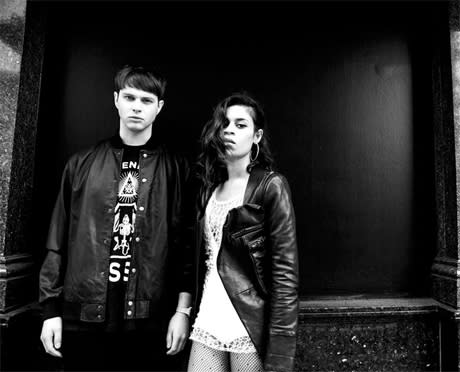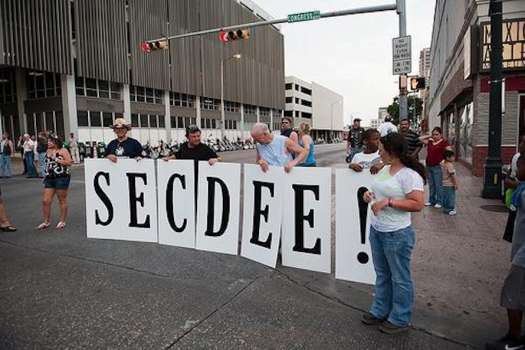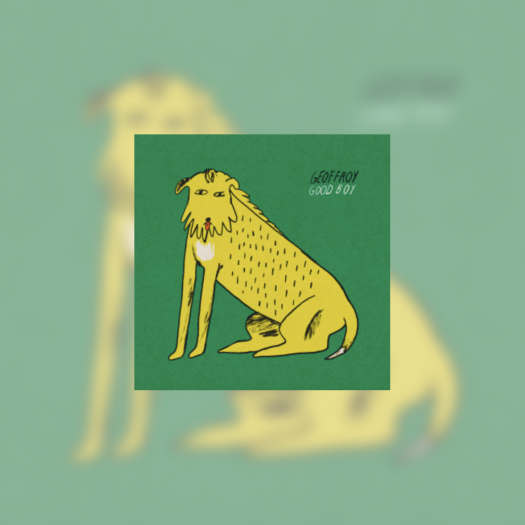AlunaGeorge is the compound name for the musical project of Aluna Francis and George Reid. She sings sugar-sweet pop melodies, he crafts bleepy production, a complex of '90s R&B (Timbaland, Neptunes), contemporary rap, 2-step garage and the Warp Records catalogue. They simply call it electronic music. Meeting online in 2009, the London, UK duo forged a partnership over their mutual love of music and spent three years making music before finally releasing their debut, a three-song 12-inch for the ominous avant-electronic label, Tri Angle. From that point on, they became ubiquitous on blogs, garnering attention by the BBC (which put them at #2 for their Sound of 2013 list) and the BRITs — which nominated them for its Critic's Choice award — and ending 2012 as the most blogged about artist of the year.
This summer, AlunaGeorge released their long-awaited debut full-length, Body Music. Packed with their three earworm singles, the 13-track album is a triumphant first effort that answers to all the hype. Just weeks before the duo come overseas to play their first-ever Canadian shows in Montreal and Toronto (September 8 and 9, respectively), Exclaim! rang up Reid to discuss how he and Francis divide the workload, where their music is best heard, and why all of the ridiculous subgenres don't represent the music they make.
You two met on MySpace. How concerned were you about meeting Aluna and it being some kind of Catfish experience?
No. I think it's a lot less daunting when it's a band. You can do a little bit more background research if you're so inclined. The thing is when I first, first met Aluna, I was also meeting her bandmates and she was there, but we didn't talk too much. We got that initial awkwardness out of the way, and then she just sort of came around and we tried to make some music. It was fine, I didn't have too many worries about that whole thing.
What year would that have been?
That would have been 2009.
You released your 12" last year on Tri Angle, which was your first release. Was it just a matter of getting the right songs in those three years?
We had accumulated a lot of tracks, but it was only in our first year that we stumbled upon the sound that we wanted to do. We took a lot of time to write songs and talk about genres specifically. We didn't want to hold each other back over what the other person wanted to do.
In an age where artists get noticed the day they post music online, you guys took your time to release music. You weren't the overnight sensation some people think you were.
No, when people only see that instant connect it is assumed, but we've been working for a long time, three-and-a-half years. Sometimes these things take time.
How did you get involved with Tri Angle? Was it helpful for you build a following on a label like that before you embarked on a major?
Robin [Carolan, owner] just asked us! The chap who runs the label just sent us an email. It was an interesting release for them because he had sort of made a lot of pop references, and I think he just wanted to come good on his word and release music that had a verse, chorus, bridge and a middle eight, with a beginning and an end to it. Something in the more traditional sense. I think that's where we fit in. It was great.
Tri Angle releases a lot of dark music, and you were a surprising choice because you have a lot of light to your music.
Yeah, at the start I was like, "Are you sure you want to do this? Like, we'd love to, but are you sure?" But he wanted to do it. The contrast was really good for us, because it really made us on our own in terms of that roster.
The press has really enjoyed trying to categorize your music. Electronic pop, experimental pop, R&B pop, futuristic pop, and my favourite: post-R&B popstep. How do you best describe your music?
Electronic music. That's what we like to put it under, be nice and vague, completely open-ended. A lot of the beats are hip-hop or 2-step influenced, and then we try to fuse weird noises…
There are a lot of those that make me think of '90s artists on Warp Records.
Yeah, for sure. Like Aphex Twin, when I first heard "Come To Daddy," it's one of those things where you hear or see something for the first time it really changes your perspective on what can be done. And that was a huge thing for me. Also on Warp is a guy called Chris Clark or Clark…
I've always found him to be quite underrated.
He really is. He had an album called Empty the Bones of You, one of his earlier ones. He's got this knack of whatever he's trying to do he does it better than anyone else.
How is the work divided between the two of you? Does Aluna help with the production and George write the lyrics?
We both have our jobs in the band: I'm the producer and Aluna is the singer. And we always give feedback to each other, so if Aluna can't figure out what I'm doing she tells me to sort it out. Sometimes the noise is just tonality, and she says, "George, what am I going to do, I can't sing to this! I can't hear a key for love nor money in that." And likewise I might have a melody on the piano and suggest that to her. Or I might write 32 bars of drum programming and some chords and she might ask me to change one of them, and I'll do that to make them more interesting. We really kind of help each other out in that respect.
Aluna writes the melody and the lyrics?
Yes, for the most part. It's quite a shared thing. Even some of it comes down to when we record, sometimes we decide to change the key or something. It's a total collaboration. But as far as lyrics and melodies, she's the starting point and the main force behind that. Myself, I'm the same with the production.
The album is called Body Music. Would you say the main goal of your album is to make people dance? You've said it's suited best for the bedroom...
The bedroom thing is more about how we started making the album in my bedroom. We wrote and recorded a bunch of songs in my bedroom, but then when we got to the studio, it was smaller than my actual bedroom. We've always worked within an intimate space. These close quarters, and I think that's always been reflected in the music. I don't know about me getting people to dance specifically… When we first called the album Body Music, it was just a name we both liked, and it's the title of a song on the album. The more we left it as a decision the more it made sense to us.
Whenever we're writing, we normally pick out the ones that have a groove to them where we're nodding our heads. It's something that we're always striving for, and I guess that groove is brought on by imperfections in the rhythms. It's nice to break out of the perfect computer, ultra-quantized, absolutely where it should be on the grid and get this groove that makes you move a little more.
I'm surprised the British press didn't turn your "bedroom music" comment into a headline about you meaning it's "shagging music" or sex music.
No one's done that, but we had a French article in I think Les Inrocks called "Sex Beat," and we all laughed. I don't think it's that kind of thing, but there are some tracks on the album that, y'know, if you saw the need to grab a loved one and take it over to somewhere else, mainly a bedroom, you go for it! But really, it's about having fun.
George, are you looking for outside production work?
We've had some fantastic people approach us, but we just haven't found any time. This is what Aluna and I have been working for over the last three-and-a-half years, so there's just no time at the moment. We're dedicating ourselves to go on tour. We spent the last three years writing, so now we want to play it for as many people as we can. We'll see, but for the meantime we're focusing on this.
This summer, AlunaGeorge released their long-awaited debut full-length, Body Music. Packed with their three earworm singles, the 13-track album is a triumphant first effort that answers to all the hype. Just weeks before the duo come overseas to play their first-ever Canadian shows in Montreal and Toronto (September 8 and 9, respectively), Exclaim! rang up Reid to discuss how he and Francis divide the workload, where their music is best heard, and why all of the ridiculous subgenres don't represent the music they make.
You two met on MySpace. How concerned were you about meeting Aluna and it being some kind of Catfish experience?
No. I think it's a lot less daunting when it's a band. You can do a little bit more background research if you're so inclined. The thing is when I first, first met Aluna, I was also meeting her bandmates and she was there, but we didn't talk too much. We got that initial awkwardness out of the way, and then she just sort of came around and we tried to make some music. It was fine, I didn't have too many worries about that whole thing.
What year would that have been?
That would have been 2009.
You released your 12" last year on Tri Angle, which was your first release. Was it just a matter of getting the right songs in those three years?
We had accumulated a lot of tracks, but it was only in our first year that we stumbled upon the sound that we wanted to do. We took a lot of time to write songs and talk about genres specifically. We didn't want to hold each other back over what the other person wanted to do.
In an age where artists get noticed the day they post music online, you guys took your time to release music. You weren't the overnight sensation some people think you were.
No, when people only see that instant connect it is assumed, but we've been working for a long time, three-and-a-half years. Sometimes these things take time.
How did you get involved with Tri Angle? Was it helpful for you build a following on a label like that before you embarked on a major?
Robin [Carolan, owner] just asked us! The chap who runs the label just sent us an email. It was an interesting release for them because he had sort of made a lot of pop references, and I think he just wanted to come good on his word and release music that had a verse, chorus, bridge and a middle eight, with a beginning and an end to it. Something in the more traditional sense. I think that's where we fit in. It was great.
Tri Angle releases a lot of dark music, and you were a surprising choice because you have a lot of light to your music.
Yeah, at the start I was like, "Are you sure you want to do this? Like, we'd love to, but are you sure?" But he wanted to do it. The contrast was really good for us, because it really made us on our own in terms of that roster.
The press has really enjoyed trying to categorize your music. Electronic pop, experimental pop, R&B pop, futuristic pop, and my favourite: post-R&B popstep. How do you best describe your music?
Electronic music. That's what we like to put it under, be nice and vague, completely open-ended. A lot of the beats are hip-hop or 2-step influenced, and then we try to fuse weird noises…
There are a lot of those that make me think of '90s artists on Warp Records.
Yeah, for sure. Like Aphex Twin, when I first heard "Come To Daddy," it's one of those things where you hear or see something for the first time it really changes your perspective on what can be done. And that was a huge thing for me. Also on Warp is a guy called Chris Clark or Clark…
I've always found him to be quite underrated.
He really is. He had an album called Empty the Bones of You, one of his earlier ones. He's got this knack of whatever he's trying to do he does it better than anyone else.
How is the work divided between the two of you? Does Aluna help with the production and George write the lyrics?
We both have our jobs in the band: I'm the producer and Aluna is the singer. And we always give feedback to each other, so if Aluna can't figure out what I'm doing she tells me to sort it out. Sometimes the noise is just tonality, and she says, "George, what am I going to do, I can't sing to this! I can't hear a key for love nor money in that." And likewise I might have a melody on the piano and suggest that to her. Or I might write 32 bars of drum programming and some chords and she might ask me to change one of them, and I'll do that to make them more interesting. We really kind of help each other out in that respect.
Aluna writes the melody and the lyrics?
Yes, for the most part. It's quite a shared thing. Even some of it comes down to when we record, sometimes we decide to change the key or something. It's a total collaboration. But as far as lyrics and melodies, she's the starting point and the main force behind that. Myself, I'm the same with the production.
The album is called Body Music. Would you say the main goal of your album is to make people dance? You've said it's suited best for the bedroom...
The bedroom thing is more about how we started making the album in my bedroom. We wrote and recorded a bunch of songs in my bedroom, but then when we got to the studio, it was smaller than my actual bedroom. We've always worked within an intimate space. These close quarters, and I think that's always been reflected in the music. I don't know about me getting people to dance specifically… When we first called the album Body Music, it was just a name we both liked, and it's the title of a song on the album. The more we left it as a decision the more it made sense to us.
Whenever we're writing, we normally pick out the ones that have a groove to them where we're nodding our heads. It's something that we're always striving for, and I guess that groove is brought on by imperfections in the rhythms. It's nice to break out of the perfect computer, ultra-quantized, absolutely where it should be on the grid and get this groove that makes you move a little more.
I'm surprised the British press didn't turn your "bedroom music" comment into a headline about you meaning it's "shagging music" or sex music.
No one's done that, but we had a French article in I think Les Inrocks called "Sex Beat," and we all laughed. I don't think it's that kind of thing, but there are some tracks on the album that, y'know, if you saw the need to grab a loved one and take it over to somewhere else, mainly a bedroom, you go for it! But really, it's about having fun.
George, are you looking for outside production work?
We've had some fantastic people approach us, but we just haven't found any time. This is what Aluna and I have been working for over the last three-and-a-half years, so there's just no time at the moment. We're dedicating ourselves to go on tour. We spent the last three years writing, so now we want to play it for as many people as we can. We'll see, but for the meantime we're focusing on this.




